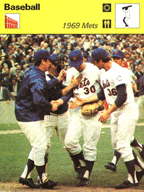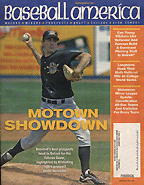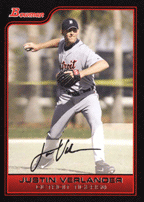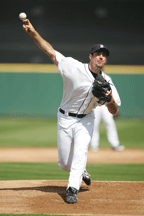| Justin Verlander — Biography | |||||
| bio | facts | what they say | my say | ||
Few things in sports are more electrifying than a pitcher in total control. When Detroit Tigers fans buy a ticket to a Justin Verlander start, there’s an excellent chance that this is exactly what they will see. With a triple-digit fastball and three off-speed pitches he throws for strikes, the MVP and Cy Young Award winner is a no-hitter waiting to happen. Even before he gained full control of his jaw-dropping repertoire, people were saying he had Hall of Fame stuff. If Justin can log a couple more seasons like he had in 2011, his ticket’s as good as punched. This is his story…
| |
GROWING UP
Justin Brooks Verlander was born on February 20, 1983 in Manakin-Sabot, a short ride from Richmond in Virginia. (Click here for a complete listing of today's sports birthdays.) Justin formed a tight-knit family with his parents Richard and Kathy and his brother Benjamin. Once when asked to name the most impressive person he ever met, Justin didn't hesitate to answer: his father.
Richard was a union negotiator in the communications industry, serving as president of the Communications Workers of America. He also knew baseball, and saw tremendous potential in Justin.
Indeed, from the first time the youngster picked
up a ball, he seemed to be destined for greatness on the pitcher’s
mound. With the help of his father, Justin developed major-league mechanics.
To this day, Richard recalls a day when his son demonstrated
just how strong his arm was. The elder Verlander picked up a rock and heaved it halfway
across a large pond. Young Justin picked up a similar stone and, to the
astonishment of his dad, cleared the pond.
When Justin was nine, he started pitching at the youth level. He had the
velocity but not always the patience or control. He could fire the ball
faster than any of the other kids—he just wasn’t sure where
it was going. Justin walked a lot of hitters and plunked plenty of others
as well. Parents complained that he was a menace on the mound. Kids on
other teams sometimes refused to step into the batter’s box against him,
while others became so disheartened that they quit playing entirely.
After his father, Justin's hero was Hall of Famer Nolan Ryan. In many ways, Justin’s ascent as a hurler followed the same path. Like the Ryan Express, the hard-throwing righty slowly but surely acquired the command he needed on his fastball and off-speed deliveries. By the time he entered Goochland High School, Justin was already varsity material. Not that this meant much in the Bulldogs baseball program. The school was not known for producing major-league talent. In fact, when Justin asked a 10th-grade friend for a loan of 50 cents, he promised to repay the money, plus one-tenth of one percent of his future pro signing bonus. Five years later, Justinwrote out an “interest” check for the amount of $3,120 in a moment that would have brought tears to Tony Soprano‘s eyes.
Justin was the best pitcher in the Richmond area. As a senior in the spring of 2001, he dominated the competion throughout the Mid-Atlantic region, striking out 144 batters in 72 innings and posting a 0.38 ERA. But despite a low-90s fastball and increasingly good control, Justin failed to attract serious attention from big league scouts. With no contract in the offing, he decided to play college ball.
Justin turned down a scholarship from Duke, opting instead for nearby Old Dominion University. There he proceeded to rewrite the school's record books. Justin spent three years with the Monarchs. He earned honors as the Colonial Athletic Conference Rookie of the Year and was a two-time CAC All-Star.
In his first year of college ball, Justin was masterful. His 1.90 ERA was the lowest in the conference, and he came within one K of the ODU mark, fanning 137 in 113.2 innings. Justin did set one strikeout record, however, when he whiffed 17 against James Madison. Named a First Team Freshman All-American by Collegiate Baseball and Baseball America, he finally began to get noticed by the baseball world. Justin was even invited to try out for Team USA. One of the keys to his success was a new lifting regimen—something he had not done in high school—which added five mph to his heater.
As a sophomore in 2003, Justin went 7-6, leading the CAC with 139 strikeouts in 116 innings. He also posted a team-best 2.40 ERA. But it was the experience he picked up over the summer for Team USA that paid even bigger dividends. Pitching against powerful international squads, Justin went 5-1 with a 1.29 ERA and helped America capture the silver medal at the Pan American Games.
ON THE RISE
Heading into the 2004 campaign, Justin was a known—and feared—commodity throughout college baseball. Now at his full height of 6-5 and weighing more than 200 pounds, he was coming close to triple-digits on the radar gun with his fastball. Hitters in the CAC were helpless against him. He matched his frosh record by striking out 17 again against JMU, fanned 16 against Virginia Commnwealth, and sat down 10 or more seven other times. Old Dominon often saved Justin for games against nationally ranked opponents. He delivered four victories in those situations, including impressive wins over Virginia and Rutgers. Justin finished the season at 7-6 and led the conference with 151 strikeouts in 106 innings.
![]()
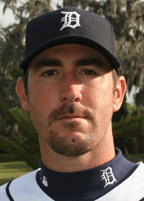
No longer ignored by the scouts, Justin was selected second in the '04 draft (after high schooler Matt Bush) by the Tigers. With several good young arms already in the system, including Jeremy Bonderman, Detroit felt it had the makings of an outstanding rotation. First, however, the team had to sign Justin.
He hired agent Mike Milchin of SFX to negotiate a contract. Throughout a frustrating summer, the two parties were miles apart. With less than two weeks to go before Justin's rights expired, Milchin refused to budge on behalf of his client. The Tigers, in turn, announced that they no longer had any interest in signing him. That's when Justin’s dad stepped in and revived the deal. He and scouting director Gene Smith worked out a contract that included a $3.1 million bonus.
Justin joined the Tigers for the 2005 season, opening the year at Class-A Lakeland. In 13 starts, he went 9-2 with 104 strikeouts and a 1.67 ERA. The book on the tall righthander said he was raw, but hitters in the Florida State League didn't believe it. Nor did the Tigers, who bumped Justin up to Class-AA Erie. There, he reeled off nearly 25 scoreless innings to earn a promotion to the big club, where he started the second game of a day-night July 4 doubleheader against the Cleveland Indians. Justin worked into the sixth inning and took the loss, allowing four runs on seven hits. He was immediately sent back to Erie.
He didn’t stay there for long. After two sparkling weeks, Justin was called back to the Tigers and pitched against the Minnesota Twins on July 23, allowing five runs in six innings. In between, he started the Futures Game in Detroit, tossing a scoreless inning.
The Tigers kept a close eye on Justin the rest of the way. When he complained of shoulder tightness in early August, they shut him down for the season. Despite the premature end to his year, Justin was named the FSL’s best pitching prospect and was also rated as having the circuit’s best fastball, breaking ball, and control. Baseball America later named him the top prospect in the Detroit organization.
Justin reported to Lakeland for spring training in 2006 with a good shot at making the Detroit starting rotation. After convincing new manager Jim Leyland that he was ready, Justin was named the #5 guy—not a ringing endorsement, but it was the shot he wanted.
The Tigers surprised everyone in baseball by starting fast and building a lead on the defending champion Chicago White Sox in the AL Central. Pudge Rodriguez was supplying timely hitting and veteran leadership behind the plate, Magglio Ordonez appeared to be back in top form, and Bonderman and Kenny Rogers helped anchor a solid staff. But more than anyone on the roster, Justin proved the difference-maker in the first half. His poise, control and stamina made him one of the top pitchers in baseball.
Justin showed he was a special hurler when he went the distance on May 23, shutting out the Kansas City Royals, 8-0. He allowed only five hits, and two of those came in the ninth. With Leyland on the top steps of the dugout ready to go to his bullpen, Justin registered the final two outs. With the victory he ran his shutout streak to 17 innings.
Justin won his last three starts in June to run his record to 10–4. No rookie in history had reached double-digits in the win column by the end of June. The Tigers built a solid lead over the summer in the AL Central, but lost their final five games. They held on for the Wild Card. Justin seemed to run out of gas toward the end of the year, but finished with 17–9 record.
Justin started Game 2 of the ALDS against the New York Yankees and was sailing along until Johnny Damon hit a three-run homer. Justin left the game on the short end after six innings, but the Tigers came back to win 4–3. They won the series in four and moved on to play the Oakland A’s in the ALCS. Justin started and won Game 2. Detroit staked him to a 7–3 lead, and he left after giving up a homer to Eric Chavez in the sixth inning.
In the World Series against the St. Louis Cardinals, Justin started the opener against Anthony Reyes. It marked the first time two rookies had faced off in Game 1 of the Fall Classic. Justin struck out eight batters in five innings, but the Cardinals touched him for seven runs, and he took the loss. Justin took the mound again in Game 5 and was better, but not good enough. He gave up three runs (one earned) in six innings, as St. Louis won 4–2 to close out the series.
Justin’s lack of sharpness in the postseason concerned some as spring training began in 2007. Would he fall prey to the dreaded Sophomore Jinx? Justin answered that question on June 12, when he pitched one of the most awe-inspiring games in team history. Justin struck out 12 Brewers and registered as high as 102 on the radar gun as he no-hit Milwaukee in a 4–0 victory.
Justin continued to roll, racking up 10 wins again by the All-Star break. This time he appeared in the Midsummer Classic, hurling one inning in a 5–4 victory by the American League. Justin was sharp all year. He finished with an 18–6 record and led the AL with a .750 winning percentage. Justin also topped the league in hit batters and wild pitches. He was not a guy batters dug in against!
After two seasons in which Justin took major steps forward, 2008 was a step backward for him. He led the AL with 17 losses and saw his ERA balloon more than a run a game to 4.84. The entire team played in a funk. After a respectable second-place finish in 2007, the Tigers sank to fifth in the division.
MAKING HIS MARK
Justin’s troubles proved temporary. He righted himself in 2009, making it clear he was ready to be viewed as a franchise starter. His control was superb—he pitched 39 more innings and walked 24 fewer batters than he did the year before. The result was a league-best 19 wins and 269 strikeouts, which led the major leagues.
Justin and the Tigers worked out a new deal prior to the 2010 campaign. It paid him $80 million over a five-year contract extension. He got off to a fast start, reaching double-digits in wins by the All-Star break for the fourth time in five years. He finished the year strong again, posting an 18-9 mark. He also lowered his ERA for the second year in a row, to 3.37.
Justin took his final step toward superstardom in 2011. He pitched magnificently all year and practically pulled the Tigers to the AL Central crown singlehandedly. He recorded his second no-hitter in May, against the Toronto Blue Jays. He actually took a perfect game into the 8th inning.
In his next start, against the Kansas City Royals, he had a no-hitter into the sixth. On June 14, Justin was at it again. He took a no-hitter into the eighth against the Indians and went on to pitch a shutout. Justin made yet another bid for a no-hitter in July when he stifled the Los Angeles Angels’ bats for seven-plus innings.
Justin won his 20th game before the end of August and finished with the AL’s pitching “triple crown”—leading the league with 24 wins, 250 strikeouts and a 2.40 ERA. He also led the AL with an .828 winning percentage. He was an easy choice for the Cy Young Award and also was named Player of the Year by The Sporting News.
More important, Justin had dragged what was essentially a .500 team to the division title, earning a lot of attention a s a potential MVP candidate. When the votes were tallied, he edged Jacoby Ellsbury for the award by 38 points.
In the postseason, the Tigers looked to Justin to lead them back to the World Series. In the ALDS against the Yankees, he started Game 1, but a long rain delay convinced Leyland to keep him on the bench when play restarted. The Tigers lost 9–3.
Justin came back to pitch Game 3. Without his best stuff, he beat the Yankees 5–4. Justin was ready to go in the deciding Game 5, but Leyland opted to combine starters Doug Fister and Max Scherzer. They got the job done, and the bullpen took over to close out the series with a 3–2 win.
Justin got the Game 1 start in the ALCS against the Texas Rangers. Again he struggled and was in the showers after four innings. The Tigers lost 3–2. With Detroit facing elimination, Justin came back to win Game 5, keeping Detroit alive in the series. Unfortunately, the Tigers imploded in Game 6, allowing nine runs in the third inning and on the way to a 15–5 drubbing.
Despite his up-and-down performance in the playoffs, finding the right words to describe Jason’s 2011 campaign is nearly impossible. It certainly raises interesting questions moving forward. For most pitchers, each new season offers a chance to improve and move forward. Can Justin be any better than he was in ’11? The law of averages (and common sense) says no. If he does, however, Justin will start to be mentioned in the same breath as some of baseball’s all-time greats.
JUSTIN THE PITCHER
When Justin is on his game, he throws free and easy, and gets the ball up to the plate at over 100 mph. At times, his explosive velocity is simply too much for hitters to handle, even the top big leaguers. When Justin mixes in his big overhand curve, 90 mph slider and changeup, he is plain nasty.
Justin’s four-seam fastball is the one that touches triple-digits. Batters have an instant to decide whether they’re seeing that delivery or the two-seamer, which tails in on righthanders. Either way, unless Justin has severely missed his location, neither pitch is hittable.
Justin is old school when it comes to the day of a scheduled start. He almost never misses a start. In fact, he led the AL in that category in 2009 and 2011. Justin also expects to finish what he starts. For such a hard thrower, he is normally very economical in his pitch count. He has his pinpoint control to thank for that.
Another thing that makes Justin tough is his ability to limit the opposition’s running game. He allows very few baserunners to start, but his ability to keep them in check is often overlooked. Justin is also a good fielder.
The Tigers are sumpremely comfident whenever Justin takes the mound. If opposing hitters are going to get to him, they better do it early. Justin gains strength as the innings pass by. If Detroit gives him a lead, Justin will take care of the rest.
| Justin Verlander — Biography | |||||
| bio | facts | what they say | my say | ||
© Copyright 2011 Black Book Partners, LLC. All rights reserved.
